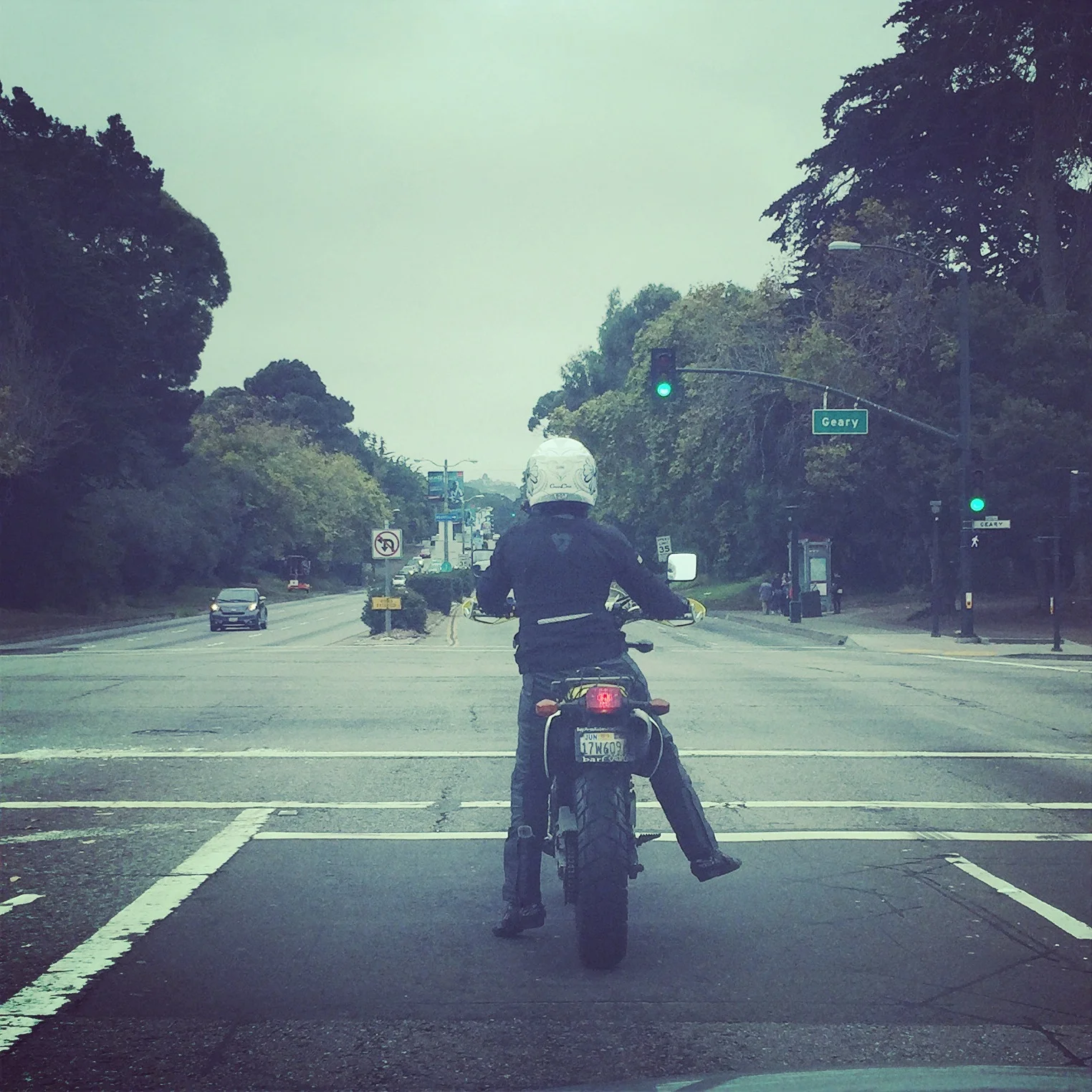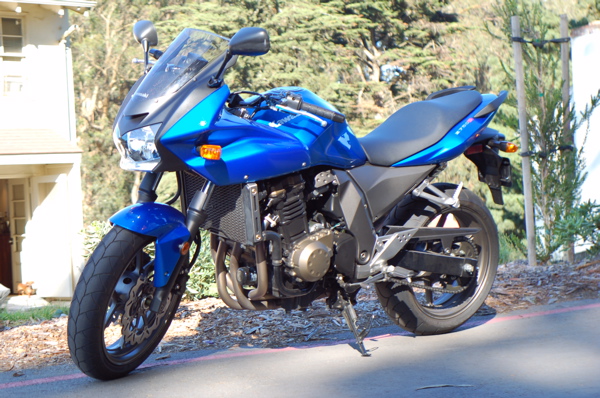Me, in 2014 riding an almost impossibly tall DRZ400SM. ~36" seat height with the knobby tires and me barely compressing the suspension.
So you're shopping for your first sportbike, or you're thinking about upgrading to a taller, heavier, faster bike? What does seat height really mean? Does it matter whether the bike is a V-Twin, L-Twin, Inline-4 or Single Cylinder engine? What exactly am I looking for beyond seat height? Does the suspension matter? These are all questions you should be asking, and you will want to ask to consider whether or not that bike really fits you.
Stop letting seat height be your only determining factor when considering what to ride!
When you initially look at seat height, say on a 2017 Suzuki SV650A (which is 30.9"), you need to know that this measurement is taken when there isn't a body sitting on it. It's simply obtained by measuring with a tape measure from the ground to the top of the seat.
2016 Suzuki SV650: Seat Height, WITHOUT YOU ON IT!
But when a person (of adult size and stature of course) sits on this bike, the rider may make the rear shock compress, which can result in an overall reduction in seat height (for me that was ~0.75" when I put in a softer spring on my Triumph). Let's go off on a little tangent here for a second.
When you're a small person like myself (130lbs, 5'2"), there are VERY few 600cc-1,000cc sportbikes/touring bikes that are designed for me to sit on the bike and compress that rear spring (if you aren't doing this, then the bike isn't set up correctly for you). And my Triumph definitely falls into that category. The stock rear shock was really meant for a heavier rider, about 150-160lbs to shmush that spring.
This is what suspension gurus (thanks Ken!) call SAG. For a more in-depth explanation of how this all works, read this.
The original rear shock that came with my Triumph before I got a customized Ohlins.
So what did I do to resolve this issue? I married a wonderful man a long time ago who bought me a used Ohlins Racing shock for my 40th birthday that I then had resprung (essentially traded in) with a new spring that was much softer and would compress (sag) under my little weight.
No, that didn't mean I could flat foot my Triumph (and I never will!). But it did mean that when I put my left foot down I didn't have to shift my butt over to the left to get it completely flat. I would say easily, a half inch lower, maybe almost an inch. And having YOUR body sit lower in the seat is far better than having the bike itself lower to the ground (for clearance, especially while LEANING which is the whole point of riding a sportbike! Otherwise, you may want to consider a cruiser because frankly they're just not meant to lean over very far).
If I had gone the lowering route, there's absolutely no way I could lean over on my bike in a corner like this. As you can see, I'm definitely NOT dragging my knee, as I'm not leaning that far over. Bottoming out is a very real risk aside from the performance issues, that come along with lowering your sporty bike. Photo: Killboy.com
So consider the suspension on the bike, on top of the seat height. How stiff is it? Where did the rear shock come from? Was it added on afterwards? Are there any adjustments that can be made now that you are going to ride this bike? If you don't address suspension from the beginning, it can greatly impact your ability to ride the bike, your perception of what you think you can ride and your overall experience.
If you don't have the funds to customize your suspension, your bike probably has at the minimum, the ability to adjust the Preload. In this handy guide from Sport Rider Magazine, they have a simple definition. If you lessen the Preload, that can also result in an immediate drop in seat height! When I bought a Kawasaki Z750S about 10 years ago, it felt a tad taller than I was ready for. But my mechanic was able to drop the Preload and bring it down to the lowest point which immediately made me feel much more comfortable. I'd say it lowered me a good 0.5" overall. (Certainly not near flat footing but at least I got the balls of my feet down instead of tip toes, and almost a flat left)
So assuming that the bike you want has a shock that's set in the range of your weight, and you have the option to adjust the Preload, you've immediately lost a good chunk of seat height. On that SV650A, I'd say you could easily chop off at least a half inch, if not an inch depending on the combination of Preload adjustment and rear shock compression.
There's also the issue of the bike itself. Now, look at the SV650 and look at my old blue Kawi above. Look at the engine. What's different? Well, first off the Kawi is a 4-cylinder, also known as an Inline-4. That makes for a MUCH wider engine overall than the SV650, which is only a 2-cylinder! And, see how they lay the cylinders at an angle on the Suzuki? That's why it's called a V-Twin. Now you've lost half the thickness of the bike between your legs. What just happened? Your knees are much closer together than on the Kawi. So when you go to put your feet down, they'll also be a bit closer to the ground because there aren't 2 more cylinders in your way. Also notice how the seats on both bikes are tapered as it gets closer to the tank. This is a good thing because again, now your knees are much closer. It's not just height that keeps your feet from reaching the ground.
Specs for the 2017 Suzuki SV650A, from SuzukiCycles.com
Another thing to consider that you will (yes you really need to) be wearing proper motorcycle boots. Not sneakers, not flip flops, not loafers. Real riding boots. Something that has a real sole, grippy, anti slip and probably ~1-2" higher in the heel. Leverage is one of our most important friends as shorter riders. Without it you are screwed. (Pssst..Stop trying to ride a motorcycle without the right gear. It's a real motorcycle, not a video game :D)
A very good example of this is the Daytona Ladystar. But you may not even need something that tall.
You may just need a regular riding boot like these Sidi Vertigo Leis, (left) which I wear every time I go riding. And even these have ~3/4" heel on them. So add that to your natural inseam.
I've also added these awesome insoles which give me another 2" of overall height! HELL YES.
Available on Amazon.com. Just do a search for Height Insoles or Lifted Insoles and you'll find a ton on Google or Amazon.
So all I'm saying is, DON'T GIVE UP just because some numbers tell you that you should! If you've been riding something for awhile and are ready for the next level, then some of these things will greatly apply to what you're thinking about riding.
Or, as a totally new rider you will also be thinking about what you can or can't ride. So make sure you start AT YOUR EXPERIENCE LEVEL. I can't emphasize this enough.
I truly think this is the #1 mistake people make (aside from not gearing up). When you start on a bike that is well beyond your level, you have no idea how to compensate for the lack of height. Instead you end up frustrated, stressed out, unhappy and probably someone with very poor riding skills as you drop your bike left and right.
A couple of caveats however, with all this advice:
- Don't expect to ride a bike with a really tall inseam (~3-6" taller than yours) if you've never ridden before! Because, no, that won't work!
- And there are NO shortcuts to becoming proficient in riding and getting better at riding. When we are short, we must ride better:
- With more precision than anyone else to ensure we brake perfectly so as to prevent dropping the bike. This means clutch/throttle control, exceptionally smooth braking and cornering, etc.
Also read this article I wrote about all the bikes I've ridden in my brief career as a motorcyclist. There are a few other things to think about when choosing the right motorcycle as well.
Good luck, and remember to consider everything when shopping for a motorcycle. Don't let anyone make a decision as personal as choosing YOUR motorcycle or motorcycle gear.















